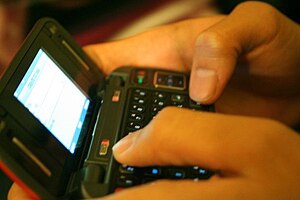
In a few months, I’ll be using the internet for 20 years. In college, I used something called GOPHER. I got email which consisted mainly of correspondence with other college students, and scientists sharing information. This was text based internet use. That’s right; this was pre-internet browser. (YIKES! I could have lost a whole bunch of you just now. You thought your browser was the internet, right?)
A whole generation knows nothing of staring at a small monitor with green LED text for connecting with others on their computers.
I had the opportunity to frequent the campus of Carnegie-Mellon University, and enjoyed playing around in computer labs in the summers, and on my holiday breaks. This was especially, delightful when the first Apple computer came out in 1984. Hello, MacPaint! The school was (and likely is) 10-15 years ahead of the curve, technology-wise, compared to other institutions. It’s said that M.I.T. wishes it could be CMU when it grows up. Things like identity cards encoded with meal plan and student account information, campus ATM machines, direct deposit of paychecks, among other things were well in place in the early and mid 1980s.
WIKI tid bit: In the fall of 1990, there were just 313,000 computers on the Internet; by 1996, there were close to 10 million.
Then came a big breakthrough for the world Wide Web: Mosaic (Early 1990s). This was 15 years before more common browsers were created: Internet Explorer, Mozilla Firefox, Safari (which I use) and later Google Chrome.
I took a field trip to NYC, and a design agency was helping the New York Times have a web presence, using Mosiac. Most companies scoffed at the internet at this time. It was merely a passing fancy, with no real practical purpose. Very few companies would put aside money to have a web presence. Netscape Navigator effectively broke the back of Mosiac in 1994, and like TV, the internet (which was not created by Al Gore, more here,) proved itself to be an invaluable innovation, not just a mere tech trend. The internet starting getting attention, and acceptance.
By 1995, I had my own email address on a home computer, and penned a local article predicting that in 10 years, everyone would be online, in the same way everyone had a home telephone at the time. Plenty of people thought that was absurd. I actually over shot that one. It was 7-10 years, probably.
Then, mobile phones were just gaining ground in the lives of ordinary people. Until that time, had been mostly a beeper market (pagers,), and those users were mostly doctors, firefighters, workaholics, and people who wanted to seem important or rich. They still make pagers, believe it or not. I’m not sure why. Security issues?
Now many of us have smart phones. Direct access to unfathomable amounts of information and connectivity from around the world. Governments, and long-standing dictatorships have been toppled as a result of shared news and information that the internet offers. And participation in internet social media is the rule, not the exception. (Case in point: Social Media just surpassed pornography as the most utilized form of internet use. Now, if that doesn’t say something, nothing does!)
We’ve emerged from the internet stone age (probably), and I cannot even imagine what is to come. You know what else? The predictions that we would be paperless, and book-less by now, were wrong. But, they were wrong about television and home movies/cable/etc. They said movie theaters would be obsolete, and shut down; and that couldn’t be further from the truth. We make room for useful technology, don’t we?
SO! What year did you get email, or start using the internet?
HEY! Remember the America Online (aol) sent out computer disks that would offer 15 free minutes if you signed up with them? I probably had 150 of them sent to me, and I never went for their offer. They would up the minutes in their promotion until it came to several hours worth.
Ahhh, the olden days. Apple won’t even be making computers with CD/DVD drives anymore. How about them apples? Even if you’re 16, you can feel old, when technology adapts so speedily.










